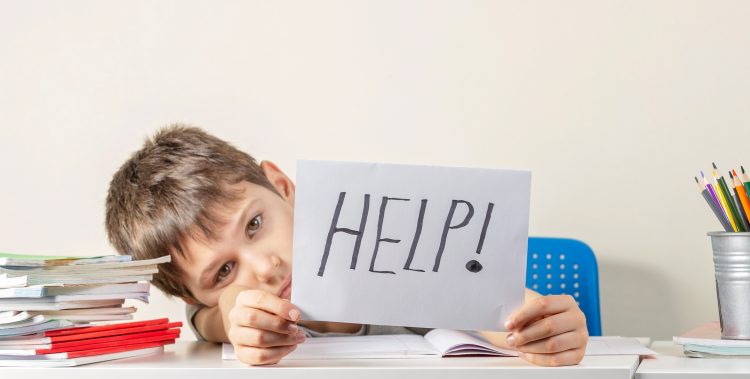
How to help when your child is feeling anxious
On June 12, 2023 by Calgary's ChildBy Stacie Gaetz
We all feel nervous from time to time. A big presentation at work, that upcoming meeting with your boss, your looming deadline… there seems to be no end to the reasons adults may feel stressed out.
Naturally, our children feel the same way. They have many stressors in their lives too: a test at school, a birthday party for a child they don’t know very well, a school field trip, performing in an upcoming concert or sports event.
As parents, we want to protect our children from fear, but we can end up doing more harm than good depending on how we talk to them about their anxious feelings.
Here are some pointers for helping children cope with nervous emotions:
Be there
The No. 1 thing you can do for your child when they are feeling stressed out or anxious is to let them know that you are there for them and you will help them get through it. Even if you forget everything else on this list, the only thing that really matters is that your child knows they are loved and no matter what happens, they have someone in their corner who will be there after it all. It can also help for you to tell them a situation that you have been in where you felt the same way. Tell them what you did to overcome it and how the situation turned out.
Teach coping
This can be a hard thing for a parent to realize but the goal is not to eliminate your child’s anxious feelings, it is to teach them to manage them. No feeling can be completely avoided and that includes nervousness. Rather than trying to escape stresses, help them find the words to express their feelings to you so you can teach them the tools they need to cope and function even when they are feeling stressed. Truly feeling their emotions and getting through them allows their intensity to decrease over time.
Tell them about the tools
So, what are some of these tools that you can teach your child? They are probably all the same things that you do when you are feeling upset. Take deep breaths, count to ten, go for a walk, positive self-talk (“you’ve got this!”), meditation techniques, move their body (three jumping jacks), talk about the problem with someone they love and trust, help them practice the thing they are nervous about, write down the fear and tear up the piece of paper, give them a hug, distract them (temporarily) with a fun activity… The list goes on and on. Think of what helps you calm down and ask them if they would like to do that (or a kid-friendly version of it).
Let them know it is temporary
Depending on the age of a child, the hardest part of any big feeling can be the fact that they don’t realize that it will end. Tell your kid that they are feeling bad now, but it will pass. Remind them of another time when they were anxious or nervous and how great they felt after when everything went well. “I understand that you are nervous for today’s dance recital but remember last year when you had that school concert and you were so worried about it and you had so much fun! You got a standing ovation, remember?”
Try to reduce anticipation
Although it may be frustrating to feel like so many factors are out of your control, there is one thing that is often up to you. If there is something you think your child may find triggering, try not to tell them about it too far in advance. Don’t tell your child that they will be going to the doctor for a vaccine the night before the appointment. Try to let them know right before you go so their time to think about it is as short as possible. Of course, this should be balanced out with letting your child prepare for an event that may need to practice for so use your judgement on when to tell them to best balance preparation and anticipation.
Have a plan
I feel better when I have talked through a problem with someone else and it is the same for my kids. If they have a certain fear such as worrying about whether you will pick them up from preschool, ask them what would happen if you weren’t there at pick-up time. If they don’t know, tell them that they could tell the teacher their parent wasn’t there and let them know that the teacher has your phone number and would call you and wait with them. Having a plan or knowing what would happen in a certain situation can go a long way to reducing anxiety for children of any age.
Model positive ways to deal with feelings
I seem to write this in every blog, but your children really will take what you do to heart much more than what you say. Talk through what you are feeling and let them know how you will get through it. “Ok guys, mom is feeling anxious because I am having a hard time finding a parking spot and we only have a few minutes to get to the appointment, but I am going to take some deep breaths and go down this street to see if there is anywhere to park. We can get through this together, guys!”
What not to do
As I mentioned, it is important that parents do not try to avoid the things that cause their children to feel anxious. Your child will feel these emotions no matter what you do to try and protect them, so the key is to help them cope with the feelings.
Try to erase the term “don’t worry” from your vocabulary. By the time you are saying this, they are already worried and you telling them not to may make them think they can’t come to you for help. A better approach may be: “Can you tell me about your worries?”
Try not to do things for your child so they don’t have to face what they are worried about. This doesn’t allow them to feel their feelings and practice using the coping tools and get through them. This process is how anxious feelings are reduced over time and without going through the process, stress, worry and nervousness will continue.
Other sayings like “it’s no big deal” and “it will be fine” may seem encouraging but they are also problematic. The worry is effecting them negatively so it is a big deal and right now they are not feeling anywhere close to fine. Sayings things like “I am here for you”, “I think I know how to help (and suggesting a coping tool)” and “let’s talk about what’s bothering you” are great alternatives.
Feelings of anxiety are different for everyone. Some children feel anxious or nervous many times a day, while other more relaxed kiddos feel this way less frequently. The key is to tell your child you are there for them and know their needs so you can help them work through these feelings in a way that is effective for them.
Recent Posts
Recent Posts

What’s New This Week?
Looking for fun and festive things to do this week? We've got exciting holiday activities for the whole family in all quadrants of the city.View all...
Archives
- December 2024
- November 2024
- October 2024
- September 2024
- August 2024
- July 2024
- June 2024
- May 2024
- April 2024
- March 2024
- February 2024
- January 2024
- December 2023
- November 2023
- October 2023
- September 2023
- August 2023
- July 2023
- June 2023
- May 2023
- April 2023
- March 2023
- February 2023
- January 2023
- December 2022
- November 2022
- October 2022
- September 2022
- August 2022
- July 2022
- June 2022
- May 2022
- April 2022
- March 2022
- February 2022
- January 2022
- November 2021
- October 2021
- August 2021
- July 2021
- June 2021
- April 2021
- March 2021
- February 2021
- January 2021
- December 2020
- November 2020
- October 2020
- September 2020
- August 2020
- July 2020
- June 2020
- May 2020
- April 2020
- March 2020
- February 2020
- January 2020
- December 2019
- November 2019
- October 2019
- September 2019
- August 2019
- July 2019
- June 2019
- May 2019
- April 2019
- March 2019
- January 2019
- December 2018
- November 2018
- September 2018
- August 2018
- July 2018
- March 2018
- February 2018
- December 2017
- November 2017
- September 2017
- August 2017
- July 2017
- June 2017
- May 2017
- March 2017
- February 2017
